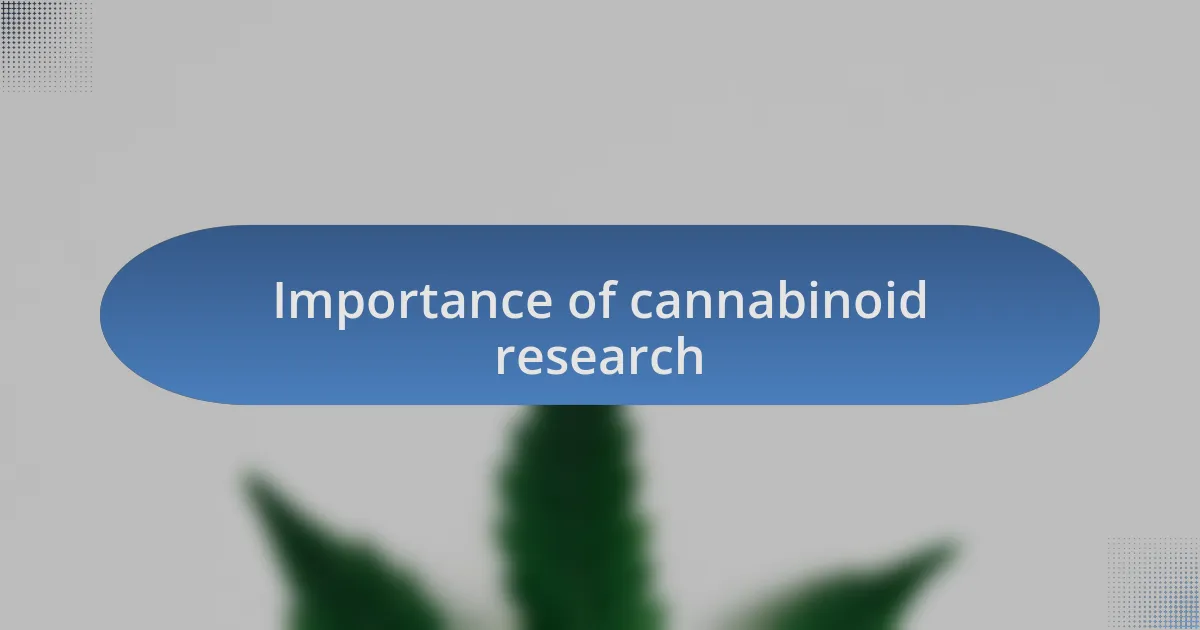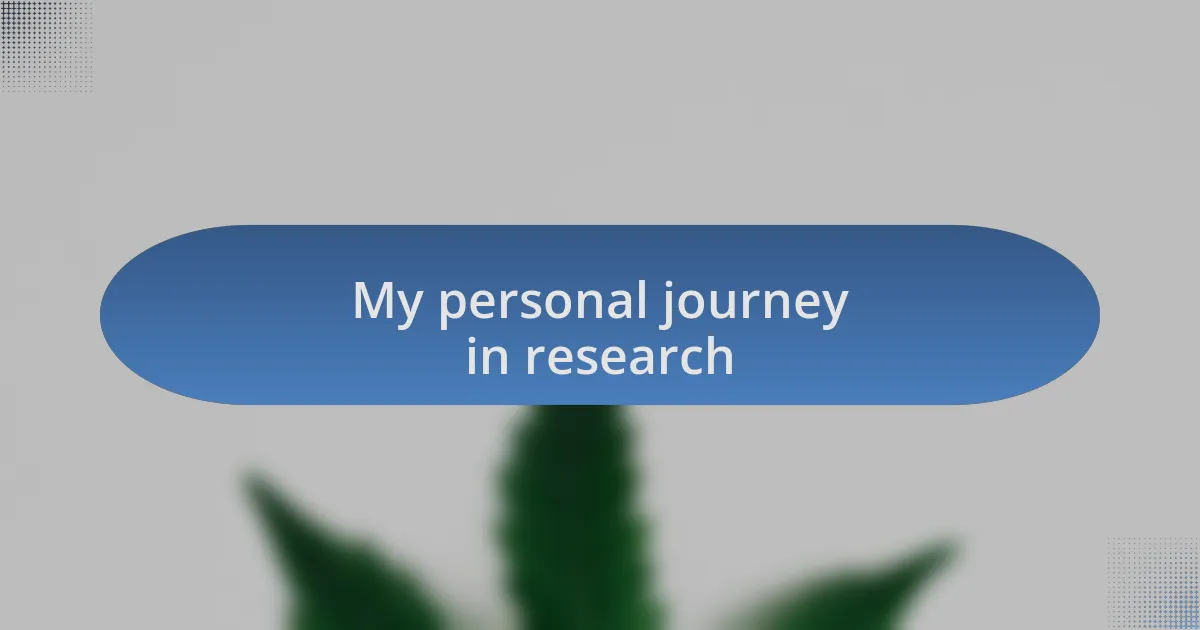Key takeaways:
- Cannabinoid research shows potential therapeutic benefits beyond traditional medicine, impacting health and well-being.
- The Cannabis Expo fosters collaboration and education, highlighting the importance of dispelling myths and sharing knowledge about cannabinoids.
- Ongoing research is essential for understanding cannabinoid interactions, particularly in mental health and regulatory landscapes.
- Future directions focus on personalized medicine and combination therapies, opening doors to innovative treatment strategies that may enhance patient care.

Understanding cannabinoid research
Delving into cannabinoid research opens up a world of fascinating possibilities. I still remember my first encounter with the effects of cannabinoids during a study on their interaction with the endocannabinoid system. It made me wonder: how can something so natural have such a profound impact on our health and well-being?
As I’ve spent time examining various studies, I’ve been struck by the versatility of cannabinoids. They are not just compounds; they are potential therapeutic agents that could change lives. Hearing stories from patients who found relief where conventional medicine failed is both inspiring and humbling, making me ponder the untapped potential that still lies ahead in this field.
In my journey, I’ve found that understanding cannabinoid research means embracing complexity. It’s not just about THC or CBD; it involves a myriad of compounds and their nuanced effects. I often ask myself: What can we learn from the synergy of these cannabinoids? Each insight feels like a stepping stone toward a more comprehensive understanding of our relationship with cannabis.

Overview of the Cannabis Expo
The Cannabis Expo stands as a premier gathering for anyone interested in the ongoing evolution of cannabis research and products. I remember my first visit, where the energy in the air was palpable, buzzing with excitement and the shared curiosity of both newcomers and seasoned professionals. It was a place where ideas flowed freely, and conversations sparked inspiration.
At the expo, I encountered a variety of booths, from cutting-edge technology in cannabinoid extraction to groundbreaking studies showcasing the efficacy of cannabinoids for specific medical conditions. I could feel the enthusiasm of researchers and entrepreneurs alike, eager to share their findings and potential innovations. It made me think: how often do we get to be part of a community so passionate about discovery and advancement?
Moreover, the workshops and panel discussions offered invaluable insights into the latest trends and challenges in the industry. One session that particularly stood out to me discussed the importance of education in dispelling cannabis myths. I couldn’t help but feel that such dialogue is crucial, as it empowers people to make informed decisions about their health. It left me pondering: how can we further spread awareness and understanding about the true potential of cannabis?

Importance of cannabinoid research
The importance of cannabinoid research cannot be overstated. I recall a moment during a panel where a researcher shared a personal story about how cannabinoids helped their grandmother manage chronic pain. That real-life impact resonated with me, reinforcing how critical it is to understand cannabinoids better. When we dive into research, we not only uncover potential treatments but also change lives.
As I listened to discussions on the mechanisms of cannabinoids, I couldn’t help but reflect on the vast array of possibilities they represent for mental health. There’s a genuine need for more studies to explore how different cannabinoids interact with our endocannabinoid system. Have you ever wondered how something so natural could lead to such profound healing? It’s exhilarating to think that ongoing research might reveal new pathways for therapies that could help many suffering from anxiety and depression.
Moreover, the legal landscape surrounding cannabis is shifting, and with that, the demand for solid research becomes even more crucial. I remember chatting with a young entrepreneur who dreamed of starting a cannabis-based wellness brand but was concerned about regulations. Without rigorous research, how can we ensure safety and efficacy? This is where cannabinoid research plays a vital role in guiding policy, fostering innovation, and ultimately building a sustainable industry.

My personal journey in research
My journey into cannabinoid research started with a spark of curiosity, fueled by a personal connection to the plant. I vividly remember my first experience at a local research symposium, where I stumbled upon a session discussing the therapeutic benefits of CBD. Listening to a panel of passionate researchers share their findings, I felt a sense of excitement wash over me. It was as if I had discovered a hidden treasure trove of knowledge waiting to be explored.
As I delved deeper into the subject, I encountered challenges that tested my resolve. One moment that stands out is when I volunteered for a clinical trial studying cannabinoids for pain management. It was a transformative experience, watching participants experiencing relief that traditional medicine had failed to provide. I couldn’t help but wonder, how many lives could be improved if we embraced cannabinoid solutions more widely?
There were also moments of frustration, particularly when navigating the complexities of research regulations and public perceptions. At one point, I attended a community meeting aimed at discussing cannabis legalization, and I felt a mix of hope and despair. Many in the room had personal stories of loss and yearning for healing that traditional medicine couldn’t offer. It reinforced my belief that every research effort has a human face behind it, driving my commitment to push forward in this fascinating field.

Insights gained from the expo
The expo was a treasure trove of ideas and knowledge, and one moment that truly resonated with me was during a workshop on cannabinoid delivery methods. Listening to experts discuss innovative techniques made me ponder how these advancements could transform patient experiences. Have you ever considered how something as simple as the delivery method could significantly impact the efficacy of treatment?
Attending the expo also allowed me to network with other researchers and advocates, fostering a sense of community I hadn’t fully appreciated before. I recall having a heartfelt conversation with a scientist whose work focused on the endocannabinoid system. She shared an emotional story about her mother’s struggle with chronic pain, which brought the research to life in a way that statistics never could. This realization hit home: behind every study, there’s a story waiting to be told.
Finally, the insights I gained from the latest findings on cannabinoids for mental health were particularly striking. One researcher shared preliminary results indicating promising links between cannabinoids and anxiety relief. As I listened, it sparked a hope within me that perhaps, just maybe, we are on the brink of a breakthrough that could support those struggling with these often invisible battles. How incredible would it be to provide those individuals with effective alternatives?

Future directions in cannabinoid research
Future directions in cannabinoid research are brimming with potential. I often find myself reflecting on the pioneering studies showcasing the therapeutic benefits of cannabinoids, especially related to neurodegenerative disorders. What if we could unlock new treatments that drastically alter the quality of life for patients suffering from conditions like Alzheimer’s? The possibility that cannabinoids could play a significant role in neuroprotection is nothing short of exciting.
One area I’m particularly enthusiastic about is the relationship between cannabinoids and personalized medicine. Imagine a future where treatments are tailored to individual genetic profiles, increasing the efficacy and minimizing side effects. I once participated in a discussion about how cannabis could be combined with genetic testing to provide more effective pain management options. It made me consider the profound impact such an approach could have on patient outcomes.
Additionally, the exploration of cannabinoids in combination therapies is gaining traction. I recall a chat with a fellow researcher who was investigating the synergy between cannabinoids and traditional pharmaceuticals. As I listened, I couldn’t help but wonder: could we be witnessing the dawn of a new era in holistic treatment strategies? The answers to these questions might redefine our understanding of therapy in the coming years.